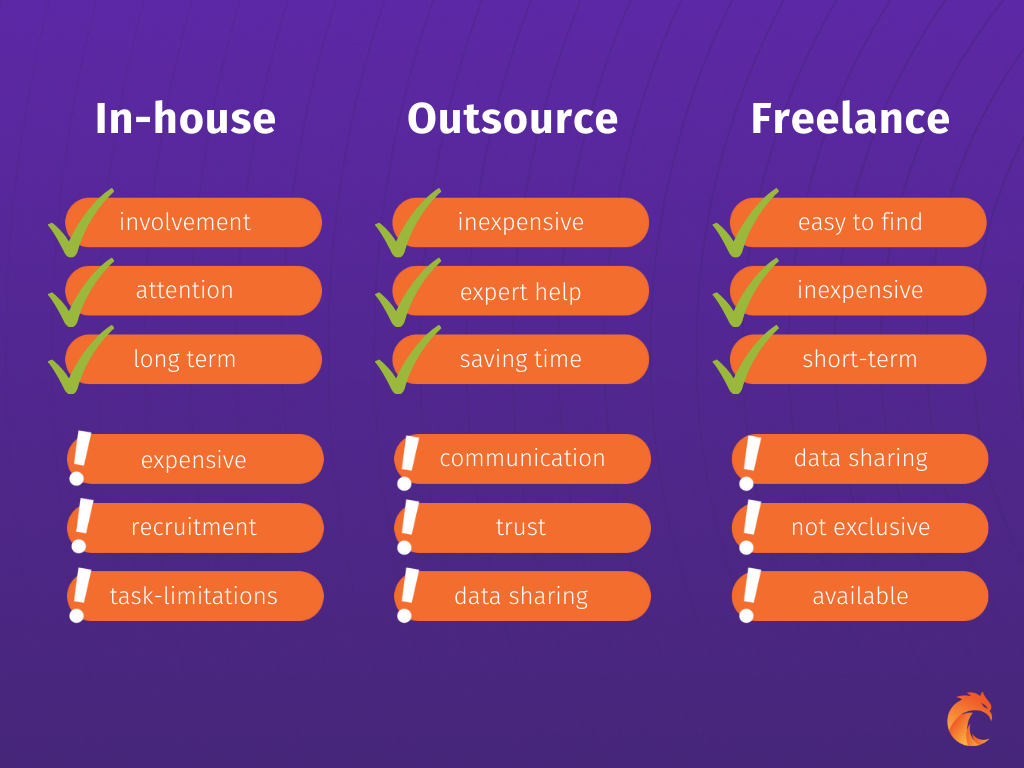In-house vs Outsourcing vs Freelancing Software Development


As the CEO of an international company or a budding start-up, you are faced with the challenges. It is a responsible decision that will affect the development of your company, but also its economic status and market position.
Producing software is a process, regardless of whether it concerns custom software, web, or mobile application. Each of them requires different knowledge and skills, tech solutions, or programming language.
However, this time let's focus on the developer cooperation model, which is crucial. There are many options in the software development market that you should consider when planning your business growth.
In this article I'll explain the advantages and disadvantages of the three most popular models of cooperation with developers to make it easier for you to decide on how to build a team. I hope this will allow you to select the necessary services in a cooperation model that is the most reasonable due to the specifics of your company.
Software development with an in-house team
Well, in-house software development is nothing more than creating your own software development team in the company's structures, without looking for outside help.
The in-house team engages full-time employees in the software production and development processes in the company. In standard thinking, this is directly hiring developers for long-term development operations within the company.
The benefits of creating your own team of programmers
A definite advantage of creating your own team of developers is their involvement in the entrusted project. For permanent employees, the company they work for is usually the only source of income, so their commitment is the basis of work. By employing a developer directly, you can be sure that he has the right amount of time and can immediately deal with the problem.
When deciding on an in-house team, you need to be sure that you will need it. For long-term cooperation. Remember that developers who decide to work full-time hope that their help will be constantly needed with emerging projects or software issues that may arise.
If you work with developers, you know how many changes in the technology market are, so when you hire one, their training is yours. Such an investment in training and employees' time should result in a long-term cooperation. Otherwise, you invest in an employee who may end cooperation with you.
Let's look at the downsides of hiring in-house developers
Responsibility and commitment to the project is one thing, but by taking an active part in one project for a long time, developers can forget about an open mind and possibilities in software development.
Wel... Time is money
If any of the team members encounter a bigger problem, they are excluded from working on other tasks. The consequences of such a developer exclusion can be serious because they are associated with a lack of timeliness or cost overruns.
Searching for talent isn't easy
A huge problem in creating your in-house team of developers is recruiting, which you, as a company, have to undertake. Despite the dynamic labor market, it is still difficult to identify real talent and skilled developers in the market of programmers interested in working full-time.
The hiring process can also be very expensive. The IT market is growing faster than the pool of developers ready to cooperate, and the employment of non-specialized developers creates additional costs, such as training, learning, or additional courses.
Remember about development
Own IT department is associated with... meeting the needs of developers. This is a specific group of employees who need continuous development, various tasks, or learning about new technologies. Often, the lack of a programmer's job in one company, with a project they already know, causes stagnation in the team, and sometimes it is the process of their resignation from work.
As an employer, you should balance the time-consuming process with costs, provide training and employee development opportunities, and challenge developers with opportunities to work with a variety of tasks.
Pay attention to the costs
Remember that having an in-house team creates the high costs of maintaining such a team. Fixed remuneration, team training, creating office space, and tools for work – it is a fairly large expense that you have to spend on the functioning of the internal development department.
Outsourcing team of developers - is it worth it or not
Let's start with what outsourcing is
Well, it's nothing more than outsourcing processes to an external company, which is the exact opposite of your own in-house development team. This form of cooperation has many benefits, but it awakens a certain object. Here is why.
Pros and cons of outsourcing software development
One of the undoubted advantages of outsourcing development services is relatively low cooperation costs. Working with the external software house provides access to specialized professionals, which allows you to save time and money spent on recruiting or training the team of developers.
Cooperation with development companies gives us a decisive advantage, which is the access of experts and talents in a specific field of programming. Starting outsourcing cooperation with such a company is often a matter of a week if the software house has a free developer.
Even if a software house does not have a free developer, such a company is often willing to start recruiting for a specific project. Recruitment can be successful much faster because the company knows the needs of programmers, has a reputation in a given technology, and developed recruitment processes.
Outsourcing software development is a great model, especially for short-term projects.
When you assume that the project won't last long and you won't need a full-time on-site person, this is a good signal to engage the outsourcing software development company.
Outsourcing development works perfectly in the case of complex processes or various technologies that you use. It is worth outsourcing some of the projects to a software house to optimize application production costs and provide professional help for your project.
Due to the different types of projects that outsourcing companies handle, they also have a fresh look at your business.
Therefore, cooperation with a software house has many benefits that a full-time employee cannot offer you.
Outsourcing of development process also has its disadvantages
Outsourcing software development services outside the company is not always an ideal arrangement. On the contrary, it is associated with many doubts that company CEOs have in mind. What can stand in the way of outsourcing a project? Well, let me explain...
Communication is key
The most common doubt in starting cooperation with an outsourcing company is communication. Companies that outsource software-related processes fear a lack of control and misunderstanding with the outsourcing company.
Check our article: 5 reasons why software development outsourcing fails
Problems with trusting the outsourcing company
Another problem that may arise is... trust. Yes, when you outsource projects to some development company, you also have to take the risk of sharing your sensitive data. That is why it is worth choosing a reliable business partner.
Of course, the software house with which you are going to cooperate with is required to maintain data confidentiality (NDA), but you should remember all security standards so that sensitive data does not get outside of the company.
Freelance software developer - when is it a good choice?
Cooperation with freelancers means easy access to an expert on the software development market. By receiving references from previous clients, you can be sure that you establish cooperation with a specialist in their field of programming. Let's take a look at the advantages and disadvantages of outsourcing a project to a freelancer.
The advantages of working with freelance developers
Freelancers in the software development market tend to be good at short-term projects. They are delegated to activities that often do not necessarily have an impact on software development. Most often they focus on a specific service or project.
Talents such as freelance software developers are easy to find. There are many platforms like UpWork that will help you find really good engineers. You don't have to spend a lot of time on a difficult recruitment process, to find a developer with specific technical development skills as is the case with an in-house team.
The cost of freelance services will be also lower than the permanent cost of hiring someone as an employee. Running a one-man freelancer business does not generate as many costs as running a software house agency. Freelancer works just by him/herself, so that means lower cost of its services as well - he doesn't hire any other people and doesn't have an extra cost of running a whole company.
The downsides of hiring software freelancers
The availability of freelancers on the market
Yes, they are available on the Internet, but if you are looking for an experienced developer with specific skills, you may have trouble adjusting to his schedule. This raises another problem with not matching your calendar and may delay the project implementation processes in your company.
Freelancers are not working exclusively
Unlike In-House and Outsourcing, freelancers can show a lack of project commitment in the event of a long-term collaboration. Most freelancers handle several projects, so they may not give you as much attention as your project deserves. Your needs will not be his top priority like eg. for your employees.
Data misused
This is also a big problem when working with freelancers. They may deliberately or inadvertently reveal sensitive data that could harm your business or processes within it.
Possible low quality of code
Software development takes time and effort to build quality code for your clients.
There may be a problem with producing high-quality code when working with a freelancer. One person's work on the code requires a lot of time and skills. That's why many freelancers, especially those who focus on short-term projects, focus on the job done and not on high-quality code. Such a method may lead to an increase in technical debt and errors in the structure of the application.

What form of cooperation with software developers is the best?
Keeping in mind the pros and cons of each form of cooperation, it is worth asking yourself what your company really needs. Regardless of whether you create your own development team, outsource development to a software house, or work with a freelancer, each cooperation model gives you many opportunities for the technological development of your company.
Ask yourself questions that may help you choose
How technically demanding is my software? Am I able to find the right developer on the employee market? Does my software require knowledge of different technologies and programming languages? Can I afford to create my own team of developers? Do I need long or short-term cooperation?
And remember that you don't have to limit yourself to one model of cooperation.
Hiring a CTO cooperating with the software house / software development team will help in maintaining perfect communication. This is a proven model thanks to which you can outsource some processes to the outside world when your internal developer department is responsible for the ongoing processes in the company.
There are many possibilities, so make sure to choose one that exactly meets the needs of your company. And if you're willing to outsource but still have some doubts, schedule a call with us to discuss how your web or mobile app project can hit the market with success.
Ready to scale your business with the right tech partner?
Related posts
Dive deeper into this topic with these related posts
You might also like
Discover more content from this category
So, it begins. You are about to start your own IT business. You have the idea, the plan, and a great pitch for the investors, and according to your plan – in about 3 years, you will be ready to join the elite S&P 500 club.
You have an amazing idea for a new web or mobile app, but... Did you test it? If not, you should do that! To check if your idea is really valuable for your stakeholders - create an MVP (minimum viable product). What exactly is this?
You came up with an idea where you see the potential to create your own app. I assume that you are looking for information on the Internet or groups of business environments, how to check if your investment will find users and have sales potential.





